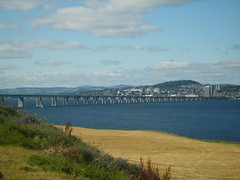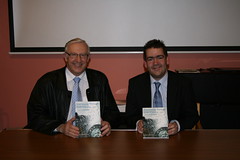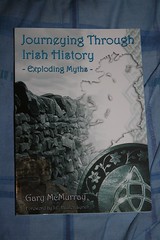I wonder what you think of when you hear the word kingdom. Perhaps you think of golden crowns with sparkly diamonds, or huge palaces, or big thrones. You might even wonder what colour the Queen will wear tomorrow when she visits Armagh Cathedral. Our minds naturally picture the earthly trappings of kingship.
Or maybe when you think of kingdoms you immediately think of borders and land and territory. Nowadays on the journey to Dublin, you don’t notice the border so much, on the new dual carriageway, but in the old days you knew when you had crossed the border; when you were in or out of the United Kingdom. Again, we’re at the physical realities of kingdoms.
So when we hear Jesus saying in our reading tonight that ‘My kingdom is not of this world’ (36), we may well wonder what he is talking about. Remember that this is Jesus the prisoner, Jesus the one who has been arrested and faced trials in the houses of Annas and Caiaphas; Jesus the one who has been struck in the face already.
Moreover, this is Jesus the prisoner, standing in the palace of Pilate, the Roman governor. Pilate, the representative of the Caesar, the most powerful man in the political world. Pilate the judge.
As we look at the passage tonight, we will see three kingdoms interacting. Two are very much of the world, and stand in stark contrast to the kingdom of Jesus, which is not of this world. By thinking about the kingdoms of the world, and about the kingdom of Jesus, I want you to consider where you stand tonight. Who is your ruler? Where does your allegiance lie?
Firstly, we are introduced to the kingdom of the religious, the Jews. We have already seen in John 18 that they arrested Jesus and now bring him to Pilate. They want Pilate to get rid of Jesus for them, in the cruelest way possible, because they can’t do it themselves.
Look at verse 28. Here you see how religion holds their allegiance. They live their life based on following the rules. ‘By now it was early morning, and to avoid ceremonial uncleanness the Jews did not enter the palace; they wanted to be able to eat the Passover.’ It didn’t matter that they were trying to kill a man, so long as they were clean to eat the Passover!
Notice also that for them, truth was compromised, just so long as they got rid of Jesus. When Pilate asks them why they have handed him over, they don’t outline the charges, or explain what he has done. Rather, they say that they wouldn’t have handed Jesus over if he wasn’t a criminal. What strange logic!
However, the saddest thing is that these were the very people who should have recognised Jesus as their king. These were the Jews, the people of God, who were waiting for their Messiah – the anointed one who would free them from slavery and restore the kingdom of their father David.
But what did they do? In Pilate’s own words, verse 35. ‘It was your people and your chief priests who handed you over to me. What is it you have done?’ These were the people who were meant to be Jesus’ people. How sad, that they rejected their own king.
Right back at the very start of John’s Gospel, we read that this would happen. John 1:11 says that ‘He came to that which was his own, but his own did not receive him.’ How terrible that word of judgement – his own people refused to receive him!
Could that be said of you tonight? As we gather here tonight, we identify with the people of God, and yet we may not recognise King Jesus. We appear religious, but its just that – our allegiance is to being a good Protestant, or a good member of the Church of Ireland. But at the end of the day, when it finally comes down to it, if religion is our king, we will choose against Jesus. The religious leaders did – look at verses 39 and 40. ‘”Do you want me to release the king of the Jews?” They shouted back, “No, not him! Give us Barabbas!”’ Give us Barabbas.
Or maybe your king tonight isn’t religion. Perhaps the king of your heart is power and wealth. Pilate had plenty of those. As I’ve said, Pilate was the Roman governor, the personal representative of Caesar in Jerusalem. If you can imagine the British empire at its height, this was Rome of the day.
The Romans had become the major kingdom of the world by conquest, and the weapons of the world. Their kingdom was most certainly of this world. For Pilate, then, to hear that Jesus claims to be the King of the Jews, is to suspect that Jesus will bring revolution and rebellion against the Roman powers. His own position could be threatened.
These rebellions were quite common – after all, the choice given to the crowd in verse 40 is between Jesus and Barabbas (who had taken part in a rebellion). Was Jesus just another of these rebel leaders who got a few followers together, a few weapons gathered, and launched a bid to get rid of the Romans? Was Pilate’s position threatened?
Yet despite his lofty position, Pilate seems out of his depth. The Jews refused to come into the palace for the trial, so Pilate himself scurries back and forth between the Jews and Jesus. Despite being the governor, the supreme judge in the area, it appears that Pilate is on trial, rather than Jesus. See him running back and forth, trying to prevent trouble and riots, yet also trying to stop Jesus from being crucified.
As we move into chapter 19 we find him becoming more and more desperate as the situation worsens for him. Yet even here, we see that power and wealth could not save Pilate. He stumbles, groping for answers, and then in verse 38 asks that question ‘What is truth?’ not realising that the one who said ‘I am the way and the truth and the life’ stands before him.
Are you blinded by power or wealth? We strive so hard to make it to the top of the pile, and then think that we have all we need. Even when Pilate exclaims that ‘You are a king, then’, still he doesn’t get it. Or maybe you’re concerned with your own position, and view potential rivals as a threat.
So the kingdom of religion doesn’t work, and the kingdom of power and wealth doesn’t work. What is it Jesus means when he declares that ‘my kingdom is not of this world’?
Well, as we have already seen, Jesus states that his kingdom is not an earthly kingdom. Up until this point, the Jewish nation had been the people of God, simply because they were the descendants of Abraham. There was a geographical boundary, and it could be observed. To use a definition of God’s kingdom – God’s people in God’s place under God’s rule enjoying God’s blessing.
So the Jewish people lived in the land of Israel, following the law and enjoying God’s blessing. Yet there is now a departure from this physical reality of the kingdom. No longer will God’s people be a nation of the world. As we read in John 1 – ‘He came to that which was his own, but his own did not receive him.’ But there, it goes on to say ‘yet to all who received him, to those who believed in his name, he gave the right to become children of God – children born not of natural descent, nor of human decision or a husband’s will, but born of God.’ (1:12-13)
This is precisely what Jesus is getting at when he says in verse 36 – ‘My kingdom is not of this world. If it were, my servants would fight to prevent my arrest by the Jews. But now my kingdom is from another place.’
My kingdom is from another place. In order to see the people of God, you can’t look at the people of Israel. Now there is distinction – between ‘my servants’ and ‘the Jews.’ Some of ‘my servants’ includes Jews, obviously, because the disciples were all Jews, but the ‘people of God’ does not mean the Jewish nation anymore.
Jesus was not establishing a new state on earth, a new country, with borders and taxation and an army to rival the Roman Empire. As he says, if his kingdom was an earthly one, his servants would have fought to prevent his arrest.
You see, Jesus’ kingdom is not like the Roman Empire, based on power and might. The kingdom Jesus comes to establish is built on humility and perceived weakness, as the king is enthroned on the cross, as we confessed in the creed just a few moments ago – Philippians 2:5-11. It was as Jesus humbled himself in obedience to death, even death on a cross, that Jesus is glorified by the Father.
This is the kingdom of Jesus – Christ crucified. But do you know what? For the religious or the powerful of the world, it doesn’t make sense. This is what Paul wrote to the Corinthians: ‘Jews demand miraculous signs and Greeks look for wisdom, but we preach Christ crucified: a stumbling block to Jews and foolishness to Gentiles, but to those whom God has called, both Jews and Greeks, Christ the power of God and the wisdom of God.’ (1 Cor 1:22-24).
First Jesus says what his kingdom is not – not of this world. But then he turns it around and speaks of what his kingdom is like.
Jesus says ‘You are right in saying I am a king. In fact, for this reason I was born, and for this I came into the world, to testify to the truth.’ (37) Do you see the double purpose – that Jesus was born to be king, and that he came into the world to testify to the truth.
The question remains then, how do we become part of Jesus’ kingdom? How do we crown Jesus as our king? Look at verse 37. ‘Everyone on the side of truth listens to me.’
Ultimately, all other claims of kingship are false. Jesus is the way, the truth and the life, and he testifies to the truth. We, just like Pilate, have a choice – to listen to the truth and recognise Jesus as our king; or to listen to the lies of the world, whether of power and wealth, or of religion. In the end, we can only crown one king – who will it be?
So be it Lord, thy throne shall never,
Like earth's proud empires, pass away
Thy kingdom stands, and grows forever,
Till all thy creatures own thy sway.







